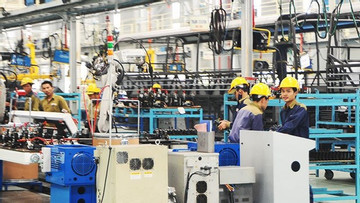- © Copyright of Vietnamnet Global.
- Tel: 024 3772 7988 Fax: (024) 37722734
- Email: evnn@vietnamnet.vn
vietnam economy
Update news vietnam economy
Vietnam striving for global value chain lift
Vietnam is transforming into a manufacturing-oriented economy via its increasing participation in the global value chain, especially in manufacturing.
Population aging is cause for concern
Vietnam’s population has reached the 100-million mark, making the nation one of the 15 most populous societies in the world.
Vietnam becomes global production centre thanks to boom of foreign investment
Despite impacts caused by the COVID-19 pandemic, foreign direct investment (FDI) is still being poured into Vietnam, contributing importantly to turning the country into a new production hub of the world.
The population is aging
By the end of this April, Vietnam’s population has reached 100 million, according to the United Nations Population Fund (UNFPA). What are advantages and challenges?
Overcoming supply chain woes could boost Vietnamese economy by $1.9 billion
TMX Global has reported that recent challenges in the supply chain sector have set the national economy back by a staggering $1.9 billion annually.
Global pressures still apparent in mission to stabilise economy
Despite a state budget surplus in the first four months of this year, economic difficulties have put a dent in government revenues, with income falling across all sectors.
Standard Chartered revises 2023 growth forecast down to 6.5%
In its latest macro-economic update on Vietnam, Standard Chartered Bank lowered the country’s 2023 GDP growth forecast to 6.5 per cent from the previous 7.2 per cent and became more cautious on the external front.
Government asked to explain EVN’s VND26 trillion loss
The NA's Economics Committee has asked the government to specify the major reasons behind the VND26.2 trillion loss incurred by Electricity of Vietnam (EVN) in 2022 and draw up solutions to fix the problems in the electricity pricing scheme.
Despite problems, businesses target record-high revenue for 2023
In the current challenging situation, Vietnamese enterprises are optimistic about economic performance in 2023, projecting revenue of trillions of VND.
Time for debt restructuring
One of the greatest concerns at the moment is the “time bomb” called corporate bonds, which may also affect the credit quality of the banking system.
Vietnam continues to face challenges in Q2/2023: HSBC
After a sluggish GDP performance in the first quarter this year, Vietnam is still not out of the woods yet. In particular, it has not seen the light at the end of the tunnel on the trade front, according to an HSBC report.
Vietnam wants private sector to become driving force for economic growth
Vietnam will focus on developing its private sector to turn it into an important driving force for the socialist-oriented market economy, contributing to rapid and sustainable socio-economic development and improving the economy's self-reliance.
How should Vietnam deal with a ‘lost decade’?
The World Bank has warned that the 2021-2030 period could be the "lost decade’" of the global economy. What will Vietnam choose to do in such a condition?
Key takeaways from PAPI 2022
PAPI 2022 shows people’s optimism about the economy despite the lingering concerns over the protracted impact of Covid-19.
Businesses need to prepare well to compete with foreign rivals
Business opportunities are being missed, project implementation is being delayed because of administrative procedures, and inspection tours are being regularly scheduled. This is weakening enterprises.
The challenge of creating the '2045 miracle'
After 40 years of reform, Vietnam still lacks private enterprises with international stature. This is a challenge for Vietnam to create the ‘2045 miracle’.
Number of new businesses up in January - April period
As many as 49,900 businesses were formed in the first four months the year nationwide, representing a rise of 0.6% against the same period from 2022, according to the General Statistics Office (GSO).
Businesses look for small jobs, workers try to glean every coin
Many businesses lack orders, and workers have had to cut spending amid financial difficulties. However, statistics agencies show reports with good figures.
Systemic weaknesses holding back impact of PSRD
The slow-paced implementation of a monetary policy is making it hard for the government to provide assistance for enterprises, cooperatives, and household businesses.
Facing a shortage of orders, enterprises struggle to maintain production
Lack of orders, production stagnation and layoffs are affecting many enterprises.



















